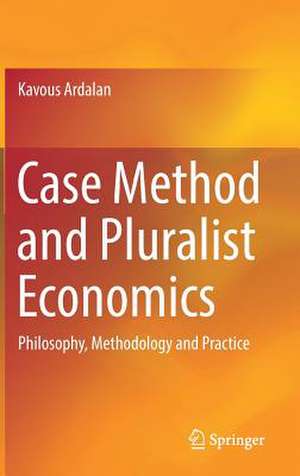Case Method and Pluralist Economics: Philosophy, Methodology and Practice
Autor Kavous Ardalanen Limba Engleză Hardback – 29 dec 2017
| Toate formatele și edițiile | Preț | Express |
|---|---|---|
| Paperback (1) | 428.13 lei 38-44 zile | |
| Springer International Publishing – 24 iun 2018 | 428.13 lei 38-44 zile | |
| Hardback (1) | 531.41 lei 6-8 săpt. | |
| Springer International Publishing – 29 dec 2017 | 531.41 lei 6-8 săpt. |
Preț: 531.41 lei
Preț vechi: 625.18 lei
-15% Nou
Puncte Express: 797
Preț estimativ în valută:
101.69€ • 106.38$ • 84.47£
101.69€ • 106.38$ • 84.47£
Carte tipărită la comandă
Livrare economică 02-16 aprilie
Preluare comenzi: 021 569.72.76
Specificații
ISBN-13: 9783319720708
ISBN-10: 3319720708
Pagini: 252
Ilustrații: XV, 232 p. 27 illus.
Dimensiuni: 155 x 235 mm
Greutate: 0.53 kg
Ediția:1st ed. 2018
Editura: Springer International Publishing
Colecția Springer
Locul publicării:Cham, Switzerland
ISBN-10: 3319720708
Pagini: 252
Ilustrații: XV, 232 p. 27 illus.
Dimensiuni: 155 x 235 mm
Greutate: 0.53 kg
Ediția:1st ed. 2018
Editura: Springer International Publishing
Colecția Springer
Locul publicării:Cham, Switzerland
Cuprins
Chapter 1: Paradigms and Foundational Philosophies.- Chapter 2: Educational Philosophies.- Chapter 3: Educational Methodologies.- Chapter 4: Educational Methodologies: Implications for Course Goals, Objectives and Contents.- Chapter 5: Educational Methodologies: Implications for the Role of Teachers and Students.- Chapter 6: Educational Methodologies: Implications for Examinations.- Chapter 7: Educational Methodologies: Implications for Student-Teacher Relations.- Chapter 8: Educational Methodologies: Implications for Faculty Teaching, Research and Service.- Chapter 9: Educational Methodologies: Implications for Institutional Mission and Administration.- Chapter 10: Educational Methods.- Chapter 11: In-Class Introduction of the Case Methodology in Comparison with the Lecture Methodology.- Chapter 12: Pluralist Economics: A Multi-Paradigm Look.- Chapter 13: Conclusion.
Notă biografică
Kavous Ardalan is a professor of finance at Marist College, Poughkeepsie, New York, U.S.A. He holds Ph.D.s in both Economics and Finance. His research interests are in the theoretical, practical, educational, social, and philosophical aspects of Economics and Finance. He has presented numerous papers in regional, national, and international conferences. His publications have appeared in various academic journals. Some of his research papers have received awards at international conferences, have been regarded very highly by publishers, have been referenced in the “Handbook of Finance” as well as in many journal articles, and have been used as course reading materials at top universities in three different continents.
Textul de pe ultima copertă
This book discusses the relationship between pluralist economics and the case study method of teaching, advocating the complimentary use of both to advance economics education. Using a multi-paradigmatic philosophical frame of analysis, the book discusses the philosophical, methodological, and practical aspects of the case study method while drawing comparisons with those of the more commonly used lecture method. The book also discusses pluralist economics through the exposition of the philosophical foundations of the extant economics schools of thought, which is the focal point of the attention and admiration of pluralist economics. More specifically, the book discusses the major extant schools of thought in economics – Neo-Classical Economics, New Institutional Economics, Behavioral Economics, Austrian Economics, Post-Keynesian Economics, Institutional Economics, Radical Economics, and Marxist Economics—and emphasizes that these schools of thought in economics are equally scientificand informative, that they look at economic phenomena from their certain paradigmatic viewpoint, and that, together, they provide a more balanced understanding of the economic phenomenon under consideration. Emphasizing paradigmatic diversity as the cornerstone of both the case method and pluralist economics, the book draws the two together and makes an effective case for their combined use. A rigorous, multi-faceted analysis of the philosophy, methodology, and practice of economics education, this book is important for academicians and students interested in heterodox economics, philosophy, and education.
Caracteristici
Discusses the relationship between pluralist economics and the case study method of teaching Provides a comprehensive approach to the understanding of economics and education Examines pluralist economics in detail Couples a multi-paradigmatic philosophical approach with practical applications for the classroom
